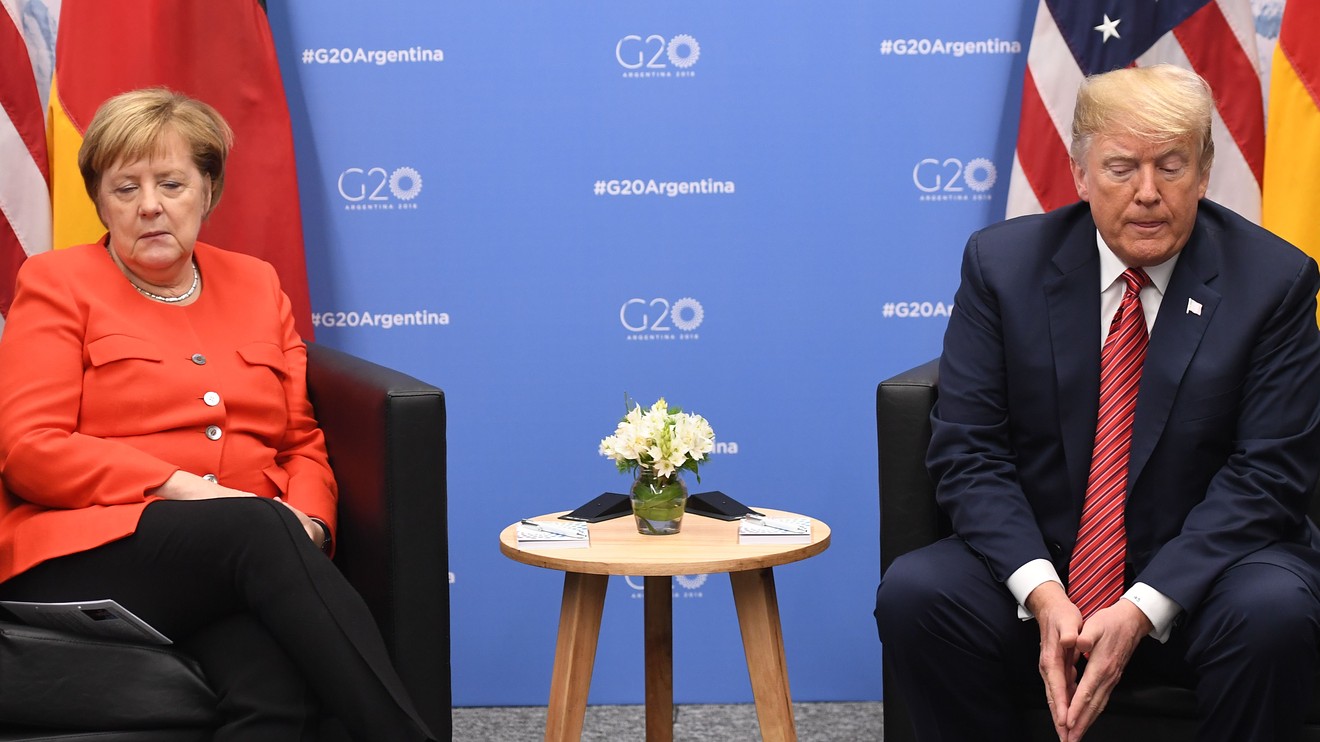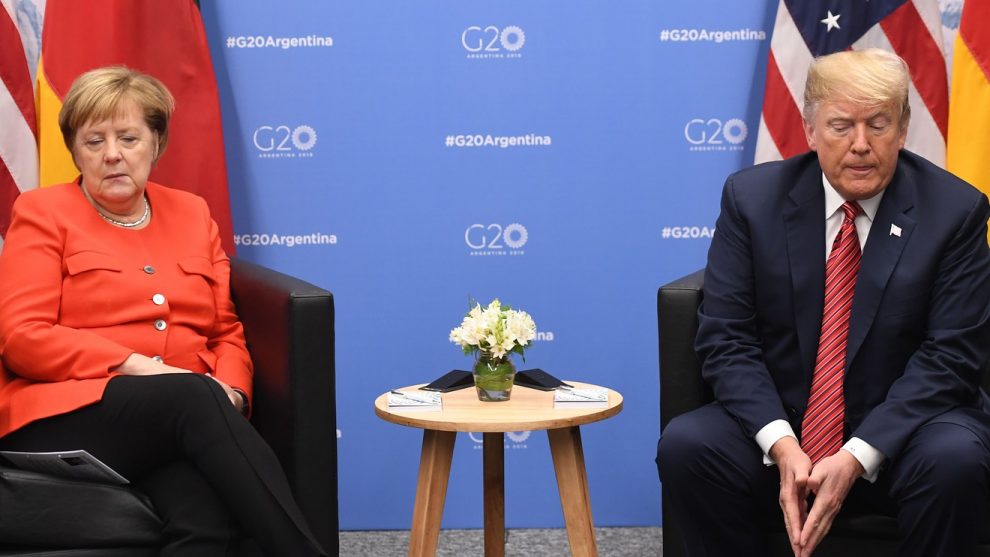
When an irresistible force meets an immovable object, something untoward usually happens. So too with the irresistible force of an American First trade policy and the immovable object of a balanced German budget under all circumstances.
The result of any U.S.-German trade collision would unlikely be pretty for Germany, Europe’s second-largest economy and Europe’s main engine of economic growth. It also would not be good for the United States, whose economy could get hit hard by German trade retaliation, a rising dollar, and the spillover effect of a German slowdown on the rest of the global economy.
Read: German flash manufacturing PMI slumps to seven-year low
Germany’s massive current account surplus has become a major source of irritation to the United States. It has done so at the very time that a principal economic objective of the Trump administration is to eliminate the U.S. trade deficit.
That Germany’s external surplus has not gone unnoticed is hardly surprising since, at around $300 billion or 7½% of GDP, Germany now has by far the world’s largest external surplus.
Already in April 2016, under the Obama administration, Germany’s outsize external surplus prompted the U.S. Treasury to place Germany on the short list of countries that the Treasury monitors for possible currency manipulation. Since Donald Trump took office in January 2017, U.S. unease with Germany’s large external surplus has only become more pronounced.
One indication of rising U.S. impatience with Germany’s external imbalance has been President Trump’s repeated accusations that Germany has been manipulating its currency for competitive advantage. He has argued that by abandoning the deutsche Mark for the euro and tying its currency to Southern Europe’s weak economy, Germany has benefited from a weak euro in place of a strong Mark.
More recently, Trump has been highly critical of Mario Draghi for intimating that the European Central Bank would most likely respond to emerging European economic weakness by lowering interest rates and by resuming its bond-buying program. In Trump’s view, the ECB was proposing to take these actions to weaken the euro in order to gain a further unfair competitive advantage at the United States’ expense..
Ominously from Germany’s viewpoint, Trump has been repeatedly threatening to level the playing field by imposing a 25% import tariff on European automobiles. Making this threat more credible, the U.S. Commerce Department decided in March that European automobiles do constitute a national security threat. The only thing holding Trump from imposing these automobile tariffs is his seeming reluctance to open up another trade war front before resolving the US-China trade dispute.
Investors should watch for developments in these three areas:
• A further significant weaker weakening in the euro, or especially if the European Central Bank cuts interest rates in response to fears of an economic shock stemming from the U.K. leaving the European Union through a “hard Brexit” as early as Oct. 31.
Read: I’m betting Boris and Brexit won’t sink Britain
• Continued European Union investigations into U.S. tech giants like Amazon AMZN, +0.32% and Google GOOG, -0.73% GOOGL, -0.72% on antitrust grounds or over taxes.
Read: U.S. Big Tech antitrust probe: Where’s the real harm from Google, Amazon, Facebook and Apple?
• A trade deal between the U.S. and China. While that isn’t seen as imminent, the two sides are scheduled to hold face-to-face meetings next week.
The last thing that an already weakening German economy can afford is a full-scale trade war with the United States. This is particularly the case at a time that its highly export- oriented economy has ground to a virtual halt and Chancellor Angela Merkel’s health issues are contributing to domestic political uncertainty. Yet that is what Germany seems to be inviting by doing nothing to reduce its large external imbalance.
As if to underline this point, the German government is ruling out any departure from Germany’s balanced budget policy. It is doing so even though such a course of action would not only be helpful in stimulating the weakening German economy. It would also help reduce the excessive level of the country’s savings and help strengthen the euro, which are the two primary sources of Germany’s outsize external surplus.
Germany’s intransigence on the balanced budget issue, coupled with President Trump’s determination to eliminate the U.S. trade deficit, seems to be putting Germany and the U.S. on a clear path toward a full-scale trade war. Such a trade war would become all the more likely if the euro were to weaken further, as a result of a hard Brexit or continued protectionist threats. Any further euro weakening would only fan U.S. claims that Germany was benefiting unfairly from an artificially low currency.
A sensible way that a U.S.-German trade war could be avoided would be if both countries compromised and committed to policies that would help reduce their respective external imbalances. The U.S. would seem to have an interest in compromising since its economy would be hard hit by a full-scale trade war with Germany. Aside from the almost certain retaliation U.S. auto tariffs would invite, a German economic recession is the last thing that a troubled world economy, already beset by Brexit and China economic woes, now needs.
The U.S. might commit to a more disciplined budget policy than is presently the case. Such a policy would be helpful in reducing the U.S. external deficit by boosting U.S. savings and weakening the dollar. At the same time, the German government might agree to loosen its budget purse strings to stimulate the European economy. Such a policy would help to reduce Germany’s large external surplus by reducing its savings and by contributing to a strengthening in the euro.
Sensible as such a compromise might be, based on Trump’s past record of large unfunded tax cuts and public spending increases as well as Merkel’s strong commitment to a balanced German budget, I am not holding my breath for such a compromise to happen.
Rather, I am bracing myself for Germany, Europe’s largest economy, to receive a body blow to its main export industry, which will not only hurt Germany but also the global economy. And that will hardly be good news for the U.S. stock market SPX, +0.47% DJIA, -0.29% .
Desmond Lachman is a Resident Fellow at the American Enterprise Institute. He was formerly a deputy director in the International Monetary Fund’s Policy Development and Review Department and the chief emerging-market economic trategist at Salomon Smith Barney.









